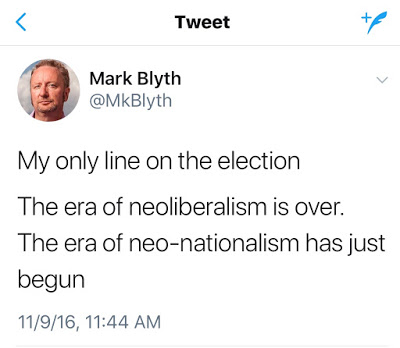A while ago I promised to return to this topic and discuss Mirowski's reply in the INET debate to my comment on his paper. And yes it's been quite a while since that debate. At any rate, I was at the Political Economy of World Systems (PEWS) conference last weekend, and we had some time to discuss Wallerstein (with him, I'm glad to say), his views on the structural crisis of capitalism. And someone (can recall who did) said something to the effect that the collapse of the economy in 2008 and the events after that (particularly the European situation with Brexit and the rise of right wing populism) suggest that the Neoliberal era is over (that was the title of a subsection of a chapter in David Harvey now classic book on Neoliberalism).So let me tackle that issue, captured beautifully
Topics:
Matias Vernengo considers the following as important: Austrian School, Cornel West, Hayek, Mirowski, Neoliberalism, Populism, Wallerstein, World Systems
This could be interesting, too:
Matias Vernengo writes Podcast with about the never ending crisis in Argentina
Matias Vernengo writes Trumponomics vs. Bidenomics: The good, the bad and the stupid
Matias Vernengo writes Debt cycles and the long term crisis of neoliberalism
Matias Vernengo writes Keynes’ denial of conflict: a reply to Professor Heise’s critique
So let me tackle that issue, captured beautifully in Blyth's tweet above (mind you mark might have been talking just about Neoliberalism in the US, as Cornel West did here), and in the process make the two brief comments I wanted to add on Mirowski. And to make sure, I don't think the era of Neoliberalism is over, in the US or globally. In fact, in many places Neoliberalism is resurgent (certainly in Latin America; I'll have something to say on Argentina soon).
The first issue, before one can discuss whether it ended or not, is what it was. Mirowski says that neoliberals are not just or fundamentally neoclassical, libertarian, classical liberals, or conservatives, and that they have, to some extent, created the confusion. That is in a sense the negative definition of Neoliberalism.
On a more positive sense, he argues that the role of the market is clearly central for Neoliberalism. Mirowski says:
"... neoliberal doctrine instead set out actively to dismantle those aspects of society which might resist the purported inexorable logic of the catallaxy, and to reshape it in the market’s image. For neoliberals, freedom and the market would be treated as identical. Their rallying cry was to remove the foundation of liberty from natural rights or tradition, and reposition it upon an entirely novel theory concerning what a market was, or should be."In his view, Neoliberalism is a movement, and not simply a set of ideas (like for example, Keynesian macroeconomics or classical political economics). And again, I must emphasize that I do agree with him, that it is a movement that revolves around the Mont Pèlerin Society (MPS). He refers to the group as the Neoliberal Thought Collective (NTC). A scientific community in the same mold of Thomas Kuhn's normal scientists. Harvey, in the above mentioned book, argues that it is a movement whose goal is to reestablish the power of capital, and disembed capital from the welfare costs imposed during the Keynesian consensus era. And certainly that seems to be the glue of the group.
However, in his response to my comment, Mirowski suggests that I commit a mistake in suggesting that Neoliberalism is subsumed in (a subset of neoclassical economics). And of course, in a certain way, if you think of a movement, it would seem that I had it indeed incorrectly and that neoclassical might be part of the Neoliberal group, but many Neoliberals are not.
However, while it is true that in that sense Neoliberalism is broader than neoclassical economics, since its scope is wider, and less of school of thought than an ideological movement, it is also true that as a movement Neoliberalism must substantiate its arguments on the basis of a set of ideas (as Keynes dixit, ideas govern the world, not vested interests).

